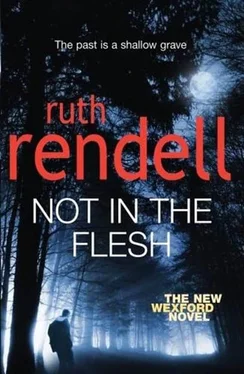He met Iman Dirir by chance in the High Street as she was coming out of Kingsmarkham's only Asian dress shop. She was carrying one of their black and gold bags.
“They're not supposed to be for Africans, but we wear much the same clothes,” she told Wexford. “I've been buying a salwar kameez for my niece's wedding. She's marrying a very handsome Englishman at St. Peter's next Saturday.”
Wexford looked his inquiries.
“She's a Christian, Mr. Wexford. You get all sorts in Somalia, animists too.”
As far as he knew, the latter worshipped stones and trees but he might be wrong, so he left it. “Will the Imrans be there?”
“At the wedding? Oh, no, I doubt it. My sister and her husband hardly know them, and my niece doesn't at all.”
“But they'll be back by then?”
“I think so. I think they're expected back on Thursday.”
He walked back to the police station, passing A Passage to India, where, behind the glass, the shimmering curtains, and the artificial lilies, he glimpsed Matea setting tables. Bridget Cook was expected in his office at two. Williams, the partner apparently without a first name, put up no opposition to her traveling to Kingsmarkham, though Wexford doubted if she had told him the true reason for her journey. As he waited he thought about people who make prisons for themselves where none need exist. This woman had landed herself with a man who was a jealous jailer, simply to avoid being alone. Tredown, who evidently cared very little for either of his two wives, had been put under house arrest by them, who wanted him only as a slave to labor for their keep. Now that The First Heaven was to be a film, for which Tredown had no doubt been liberally paid and from which his widow and ex-wife would enjoy the royalties, they were indifferent to his life or death.
Hannah brought Bridget into the office. An old-fashioned expression came into his mind when he saw her: “raw-boned.” A description everyone understood but which seemed meaningless. She wasn't thin yet the bones seemed to protrude through her skin. Her hands were like a man's and the ring on the left one, with its delicate tracery of leaves, looked incongruous. She sat down heavily but flinched a little when Wexford showed her the knife.
“I don't know,” she said. “I only saw it the once. It was the guys he hung out with, a rough lot, they were. He said he needed it for his own protection. He never used it, though. I'm sure he never did.”
“You said he was a poet. He wrote poetry to you.” Wexford was conscious of how absurd this would sound and look to an unseen observer, the human fly on the wall. This woman and poetry could hardly be set side by side without raising a raucous laugh. Yet love, he knew, is no respector of beauty or grace. Like the wind that blows where it lists, it can strike almost anyone for almost anyone else. People have no need of love potions in order to fall in love with the ass's ears. He noted the serious nod she gave, the acceptance that she was worthy of verses dedicated to her. “Did he write anything else?” he asked. “A play? A piece of fiction?”
“I don't know. Maybe. He wasn't educated, but he told me he'd written a book once. Poems and a sort of diary, he said it was.”
“When did you first meet Samuel Miller, Miss Cook?”
“Sometime in '98, it would have been. He moved in with me like in the winter. We was on a site near Southend then. He'd go away a bit, but he always came back. We went strawberry picking up near Hereford in the June, and he said they wanted pickers at Morella's in Flagford in the September. That was when he said we'd best get married. I said I was years older than him, but he said, So what? He'd always fancied older women.”
Claudia Ricardo, Wexford thought. “He'd been to Flagford three years before?”
“That's right. Morella's had got a proper campsite, not like the field they had to camp on when he was there before and two guys went after them with guns.”
“Guns?”
“That's what he said.”
Adam Thayer brought in the tea. It was scalding hot, but Bridget Cook drank hers greedily. “Go on, Miss Cook.”
“He wanted to look up old pals while he was there, he said. Them was his words, ‘old pals.’ There might be some money in it. They owed him. The day after he'd fixed up our wedding we went picking-it was Victorias-and when we got back he said he was off to see his pals and then have a bit of a wash in a house that was empty on account of our shower going wrong. I waited and waited for him, but when it got to midnight I just knew he wasn't coming back. I just knew, I don't know how. It was a funny thing because I thought he really liked me. Maybe it's just that men are a funny lot-sorry, I didn't mean you.”
Wexford assured her he hadn't taken it personally. That made two women who waited for their men to come back and waited in vain, one eleven years before, the other three years after that. He still couldn't tell if there was any connection between the two men, but nor could he believe in so great a coincidence.
Sheila was with her mother on the following evening. She had left the children at home with their father and the nanny while she attended the second meeting of the African Women's Health Action Group. Wexford thought of telling her about the Imrans taking their five-year-old daughter home to Somalia and his questioning of their motives. He thought of it and dismissed it. She would launch into one of her impassioned speeches, a denunciation of injustice, wanton cruelty, child abuse, and, most telling for him, a catalog of instructions as to what violent action he ought to take, and take within the next couple of hours. Instead he asked her about the film. Had shooting started yet?
“It won't for ages, Pop. Months.”
“I hope they're paying you well, though I don't suppose it's Hollywood sort of money.”
“Well, no,” she said, “but it's not bad. Did you know the author's very ill? He's not expected to live to see the film. Isn't that sad?”
“They must have paid him a lot for the rights.”
“You're untypically interested in money today, Pop.”
He laughed. “I've met him, you know. I could say I know him. I suppose it will all go to his wife.”
“Who else?” said Sheila and she went off to get ready for her meeting.
Dora went with her in the black Mercedes with the handsome driver, but Wexford sat on, watching rain, then hailstones, lash the French windows, waiting for Burden to come and share his red-wine ration. No doubt the inspector would defer leaving his house until the rain, forecast as only a shower, passed away over the horizon. He turned his thoughts toward Tredown in the Pomfret hospice. Lord, let me know mine end and the number of my days. Where did that come from? The funeral service, he thought. It was only those with a terminal illness who knew these things and then not accurately. Tredown could only say, I have sixty days at most and (for example) twenty days at least. Did he look back on his life and think it had been good? A wife he had divorced, a second wife whom it was hard to believe anyone could love, those dull Bible-based novels, that one good enduring book he had written… If he had written it.
The doorbell ringing made Wexford jump. He got up to let Burden in. The inspector was rather wet, his hair plastered down, raindrops on his face like tears except that he was smiling. “I got caught in it, stood under a tree till it stopped. Don't say I might have been struck by lightning, I know that already.”
“There wasn't any lightning, was there?”
“According to my wife, there's always lightning when there are hailstones.”
Wexford poured two large glasses of claret. “I was thinking about Tredown.” He raised his glass, said, “Owen Tredown. May he have a peaceful end, and soon.”
Читать дальше











